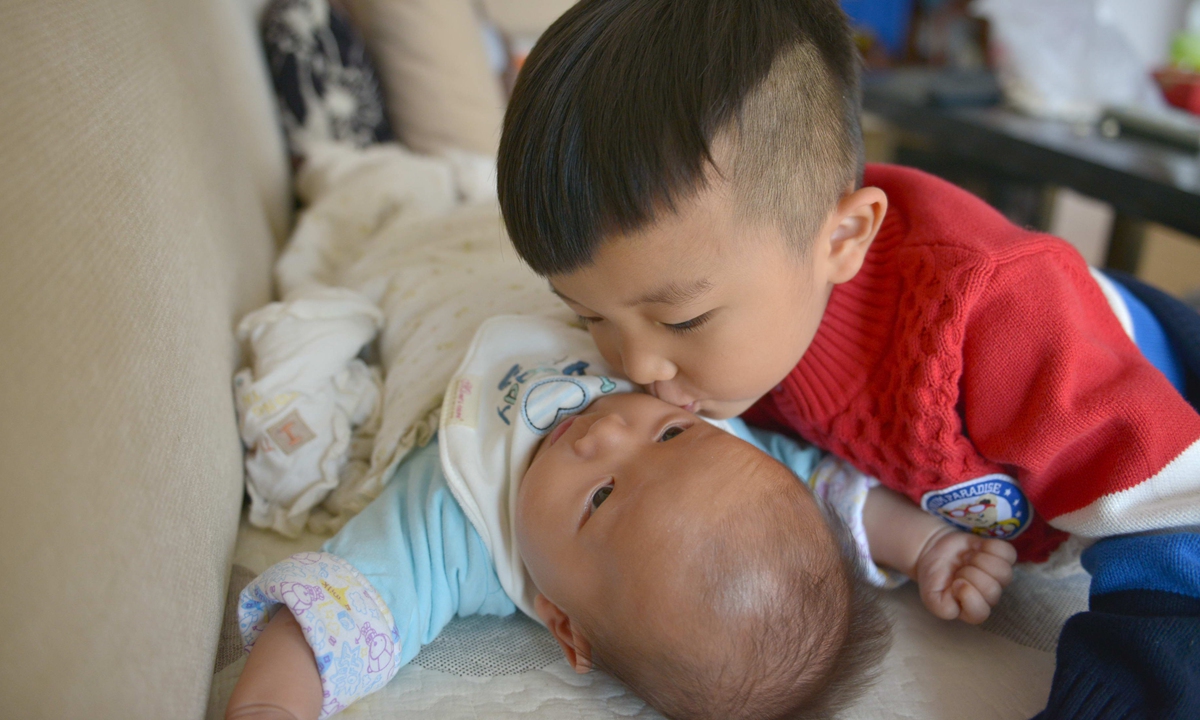Demographers suggest further reform of the family planning policy as projections show China's annual births may fall below 10m

The older brother kisses his younger brother on his face in a family of two children in Guiyang, Southwest China’s Guizhou Province. Photo: VCG
Chinese population experts predicted that China's annual births may fall below 10 million during the 14th Five-Year Plan period (2021-2025) and suggested that China should loosen its family planning policy as soon as possible, although the central government has not yet released the specific data from the seventh census.
China kicked off its seventh national population census in November 2020 and the results were previously scheduled to be released in early April. However, the results have not yet been released, sparking speculations from the general public.
At a press conference on Friday, Liu Aihua, spokesperson of the National Bureau of Statistics, said, "We hope to release more detailed information, so the preparation work before the release of the census has increased accordingly.". She also highlighted that work will pick up to release the final results of the census to the society as soon as possible.
While the release of the data has been delayed, demographers continue to explore solutions to the expected drop in the birth rate.
In an interview with yicai.com, Dong Yuzheng, Director of the Guangdong Institute of Population Development, said that in the absence of fertility policy adjustments, according to the current trend, the annual number of births is likely to fall below the 10 million mark in the next few years.
"It is about the people's willingness to have children now. Some people are afraid to have children and some do not want to have children. The whole concept of fertility has changed significantly," Dong said, adding that "the number of women of childbearing age is decreasing, meaning that fewer people can be potential mothers. As the age of marriage is increasingly delayed, the actual number of women of childbearing age each year will be even less."
Dong said that the declining trend of child births in the past few years seems shocking. "As a large country of 1.4 billion people, the number of births a year is dropping to less than 10 million. If we follow this trend, it may not take more than a few years for our total population to have negative growth."
Dong suggested that family planning policies should be completely lifted. "Now the situation is already very serious and it is very difficult to reverse the population development once a major trend of the problem has emerged."
Peng Xizhe, Director of the Fudan University Center for Population and Development Policy Studies, also suggested that the authorities should further ease restrictions in the number of births and encourage young couples to make their own family planning to solve the problem of an aging population.
"We should also further build a family-friendly society by giving more social support to childbearing, such as reducing the employment pressure on women caused by having children and further improving the compensation policy," Peng told the Global Times.
On April 14, China's central bank also published a working paper saying that it should be recognized that China's demographic situation has reversed, that the population will decay faster than expected after the transition, and that education and technological progress will hardly compensate for the population decline.
The paper also recommended that the family planning policy should be fully liberalized and women's difficulties with pregnancy, childbirth, daycare and schooling should be addressed.
According to a report published in February by a research center under the Ministry of Public Security, the number of newborn babies registered with public security organs in 2020 was 10.04 million, 15 percent down from the figure in 2019. The Minister of Civil Affairs, Li Jiheng, said in December that China's population development had entered a critical turning point.
There has been a declining curve of yearly new births in China, from 17.86 million in 2016 to 14.65 million in 2019, according to data released by the National Bureau of Statistics.



